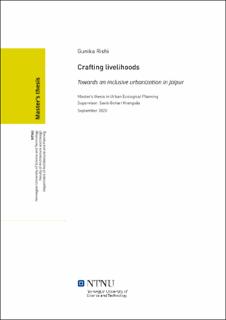| dc.description.abstract | While cities have benefited from being the epicentre of urbanisation, the pace and scale of the process are accompanied by unequal distribution of resources that leave many behind. In India, which has a society segregated on the lines of ethnicity, religion, caste, and income, the repercussions are more deepening along with the existing social biases. The city of Jaipur, a UNESCO world heritage site, has witnessed large scale development along with ambitious policy level schemes that aim at uplifting both, the tangible and intangible historical assets of the city. However, the artisans who form the backbone of the city’s heritage, live a stark reality that excludes them from the rapid heritage-based development. In such a tenuous situation where urbanisation capitalises on the artisans’ heritage and craft, it becomes important to explore how the community itself accesses resources in an evolving and volatile socio-political urban context. This thesis regards urbanization should be an inclusive process, and with that under consideration, it aims to investigate the constraints and opportunities the artisanal community have in securing critical resources. With this objective, the thesis adopts the Sustainable livelihood framework (SLF) and by conducting interviews, observations and transect walk, it uncovers the making up of the available and deficient resources that form the livelihoods capitals for four artisanal communities. As the findings of the study, the social capital propounds as the strongest asset with an active connection to the more deficient political and financial capital. The study argues that in order to move towards inclusive urbanisation there is a need to take into account the highlighted gaps between the state initiatives and the livelihoods of the community.
Keywords: Urbanisation, Inclusivity, Artisans, Communities, Jaipur, Livelihoods, Capitals, SLF | |
